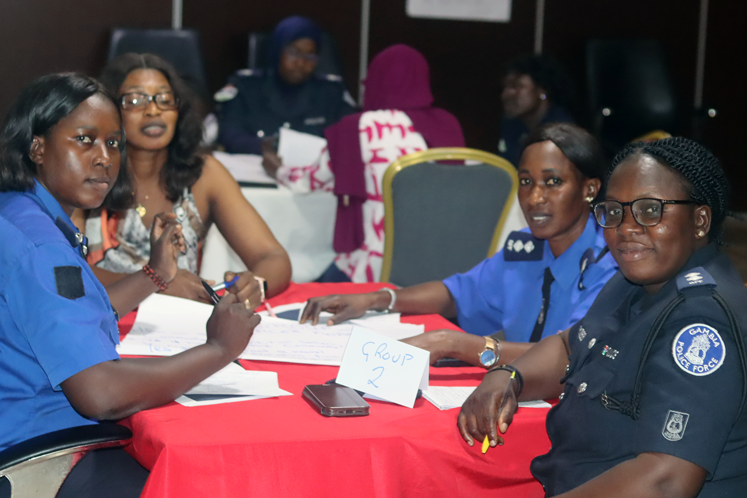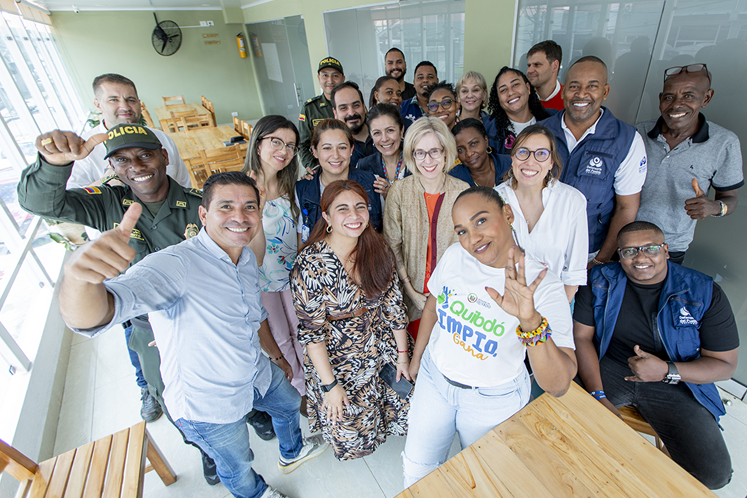Achieving sustainable development through SSG/R
For the seventh consecutive year DCAF will take part in the High-Level Political Forum for Sustainable Development (HLPF), the main United Nations global platform for review of the 2030 Agenda and the Sustainable Development Goals (SDGs). This week, we will hold once again, an official HLPF side event.
DCAF is dedicated to making people safer through more effective and accountable security and justice institutions. We know that peace and security provide the foundation for sustainable development. By helping security actors meet the security and development needs of the population they serve, DCAF’s work makes a critical contribution to the 2030 Agenda.
In 2023, we began monitoring our projects against the SDGs. Our internal analysis found that DCAF’s projects contribute to several SDGs, most notably SDG 16 on peace, justice and strong institutions, and SDG 5 on gender equality.
More specifically, 65% of our projects promote the development of effective, accountable and transparent institutions (SDG target 16.6); 46.5% strengthen national institutions to prevent violence and combat terrorism and crime (SDG target 16.a); and 42% promote responsive, inclusive and representative decision-making (SDG target 16.7).
DCAF is working on many projects that contribute to the Sustainable Development Goals, and these two examples illustrate how SSG/R is central to delivering SDG16.
SUPPORTING THE GAMBIAN SECURITY SECTOR REFORM PROCESS

Photo: DCAF.
Since 2017, DCAF has been supporting the Security Sector Reform process in The Gambia, initiated in the framework of the country’s political transition. DCAF’s support has focused on strengthening the effectiveness, efficiency, and accountability of the Gambia Police Force (GPF) and the Gambia Immigration Department.
DCAF supported the GPF in developing its first Police Doctrine, which is expected to enhance its effectiveness, accountability and transparency (SDG target 16.6). 96% of respondents to a 2023 staff survey said that line management, leadership and communication had improved inside the Force.
Additionally, through strengthening operational capacity, the programme contributed to enhancing the GPF’s capacity to prevent violence and combat crime (SDG target 16.a), which in turn may have led to a better perception of the police by the population. This is partially evidenced in a 2023 community perception survey which saw a sizeable increase in the effectiveness of the National Police Force since 2019.
DCAF’s efforts in The Gambia also focus on gender mainstreaming within the GPF and Immigration Department by developing a gender policy and a mentoring scheme with the Thames Valley Police in the UK (SDG 5) which led to an unprecedented number of female officers being promoted to leadership positions.
WORKING ON POLICE EFFECTIVENESS AND ACCOUNTABILITY IN COLOMBIA

Photo: Orjan F. Ellingvag for DCAF.
Since 2020, DCAF has been working with the Colombian National Police (CNP) to improve their relations with the media. By fostering good governance principles, human rights standards and enhancing the media relations capacity of the police, this has contributed to creating a more effective and accountable police service (SDG target 16.6) and to preventing violence against journalists (SDG target 16.a).
DCAF brought together the CNP and the Foundation for Press Freedom who created the first-ever guidelines in Latin America for improving relations between police and the media. The CNP also strengthened its training regime on the use of force, and established regular meetings between the police and journalists. These efforts have led to important institutional changes in the Police Force: cases pertaining to abuse of journalists’ rights are better investigated, concrete measures regularly taken, and in several instances, the Director of the Police has issued public apologies to journalists subject to police brutality.
The media and police relations programme has now been expanded to Mexico, Honduras, Ecuador, and Peru.
SSG/R AS THE BRIDGE BETWEEN SECURITY AND DEVELOPMENT
At a time when structural injustices, rising inequalities, and emerging human rights challenges threaten efforts to achieve peace and security for all, accelerating progress towards SDG 16 is critical. However, without effective, transparent and inclusive security and justice institutions, progress towards SDG 16 will remain stalled.
This risks the 2030 Agenda becoming, in the words of the UN Secretary-General, “an epitaph for a world that might have been”. But DCAF continues to be dedicated to the realization of SDG 16 by assisting national and international partners to establish effective, accountable and transparent security sectors.
There can be no sustainable development without peace, and no peace without sustainable development.
- 2030 Agenda
To share the knowledge that we have gained, we created the Good Practices Toolbox On SSG/R And SDG 16, which includes examples of how security sector oversight actors have contributed to realizing SDG 16, and aims to inspire further initiatives and policies. The examples included in the Toolbox illuminate the central role of good security sector governance in achieving SDG 16 and the 2030 Agenda.
 Share on Facebook
Share on Facebook Share on Linkedin
Share on Linkedin Share on Twitter
Share on Twitter